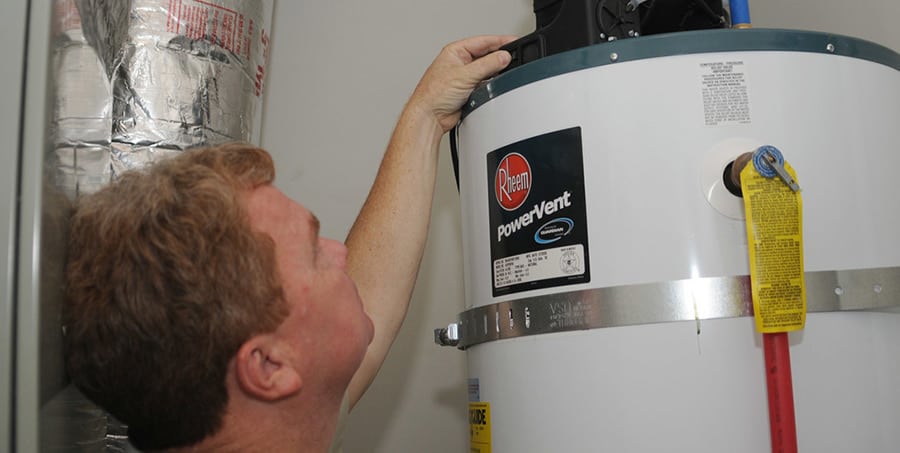They are making several good points on the subject of Is Your Water Heater Leaking? in general in this post down the page.

A hot water heater is among the most vital standard appliances that can be found in a residence. With water heaters, you don't require to undergo the stress and anxiety of home heating water by hand each time there is a requirement to take a bath, do the laundry, or the dishes. There is constantly an opportunity that your water heating system would certainly act up as with many mechanical devices.
It is important to keep in mind any type of little malfunction and also tackle it quickly prior to things get out of hand. Many times, your hot water heater starts to malfunction when there is an accumulation of debris as a result of constant use. As a preventative measure, regular flushing of your hot water heater is suggested to stop sediment accumulation as well as protect against practical failing.
Common water heater emergency situations and also how to take care of them
Leaking hot water heater container.
In this circumstance, you must transform off your water heater, enable it to cool down, and also very carefully look for the source of the issue. At times, all you require to do is to tighten a couple of screws or pipeline links in cases of small leaks. If this doesn't work and also the leak persists, you may require to use the solutions of a specialist for an ideal substitute.
Fluctuating water temperature.
Your water heating unit can start generating water of different temperature levels typically ice hot or chilly hot. There could be a need to change either the heating or the thermostat system of your water heating system.
Inadequate hot water
It might be that the water heating system can not support the hot water demand for your apartment or condo. You can update your water heating unit to one with a larger capacity.
Blemished or odiferous water
When this happens, you require to recognize if the concern is from the water or the tank source. If there is no funny scent when you run cool water, after that you are particular that it is your water heating system that is defective. The stinky water can be triggered by rust or the accumulation of microorganisms or sediments in the water heating system storage tank.
Verdict
Some house owners ignore little caution and minor faults in their hot water heater unit. This only results in more damage as well as a feasible total malfunction of your device. You should take care of your hot water heater faults as soon as they come near avoid more costs and also unnecessary emergency difficulties.
With water heaters, you do not require to go with the stress and anxiety of heating water manually every time there is a need to take a bathroom, do the washing, or the recipes. Your water heating unit can begin generating water of various temperatures generally ice scalding or chilly hot. It might be that the water heater can not sustain the hot water need for your apartment. If there is no amusing scent when you run chilly water, after that you are certain that it is your water heating unit that is damaged. The stinky water can be triggered by rust or the build-up of germs or debris in the water heater tank.
Common Water Heater Issues and What You Should Do
What Type of Water Heater Do You Have?
Before we begin it’s first important that you identify the type of water heater you have on your property. There are two main types of water heaters out there: conventional and high efficiency.
Both of these types of products typically use either gas or electricity to heat power. There are also solar water heaters that use a thermal collector on the roof or yard to heat the water.
While these models are not as common, they can cut heating costs in half. In this article, we will focus on conventional and high efficiency.
How Do My Electric and Gas Water Heater Work?
Though they look similar, electric and gas water heaters work very differently. It’s important to know their basic function because often problems can be specific to the heating source.
In the electric model, a thermostat on the side of the machine detects the temperature of the water in the tank. When the temperature needs to rise electricity flows to a heating element suspended in the water.
Gas models also use a thermostat device — typically with a mercury sensor at the tip and an additional sensor called a thermocouple. The thermocouple detects whether the pilot light is on and controls the flow of gas.
When the thermostat drops below the appropriate level gas is released which becomes ignited by the pilot light. The flame heats the bottom of the water tank which causes hot water to rise and cold water to drop.
This natural circulation continues until the water reaches the desired temperature. Then, the thermostat triggers the gas control valve to shut off the flow of gas.
What Are the Most Common Issues and How Do You Fix Them?
https://happyhiller.com/blog/common-water-heater-issues-and-what-you-should-do/

Do you enjoy reading about Common Hot Water Heater Problems? Try leaving a remark down below. We would be pleased to find out your insights about this blog posting. In hopes to see you back again before long. If you enjoyed reading our blog post please remember to share it. Thank you so much for your time invested reading it.
Apply Now